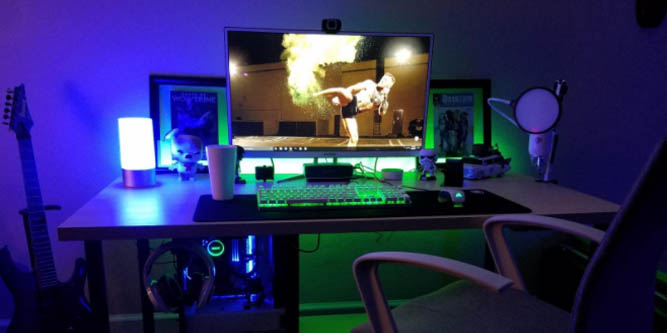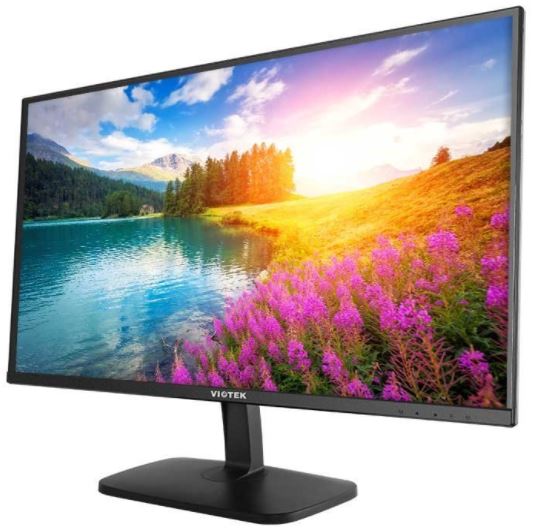When it comes to monitors, every additional feature you get is tagged on the price. That’s why choosing the right monitor is a matter of knowing what you’re buying, and what features you can do without. If you don’t know what you’re doing, it’s easy to end up spending an extra $50 or $100 on features that you don’t actually care about, or could’ve easily lived without. The right monitor for you entirely depends on what features you want, and what features you don’t care about.
Choosing Your Monitor’s Size and Resolution
The size of a monitor isn’t just a matter of how big the screen is. The size of a panel needs to be considered relative to the resolutions you intend to use. That’s because the pixel density of any particular resolution will grow or shrink depending on how thin you’re spreading those pixels. For example, giant 32-inch monitors are far too large for 1080p resolution because their pixel density is visibly thin.
Technically speaking, 24-inch monitors are the optimal size to display the pixel density of 1080p content for typical computer-monitor viewing distances. But a 24-inch monitor is too small for an immersive multimedia experience, and it doesn’t offer enough workspace to be used as multiple monitors!
That’s why 27” is widely regarded as the speed spot for anyone running 1080p resolutions. They’re large enough to provide two-monitors worth of application space for multitasking, and they’re big enough to be fully immersive from regular sitting distances. In short, they’re about as large as you can make a panel before you end up blatantly obvious pixel density problems.
1080p or Higher?
Anyone thinking about buying a monitor over the next few years will likely find themselves tempted to consider higher resolution panels. However, 1440p, 4K, and all higher resolutions are still an extremely inadvisable selection for everyone except enthusiasts. It takes an enormously powerful graphics card to power a resolution greater than 1080p.
After spending hundreds of extra dollars, you’ll find there’s still not that much content specifically designed for ultra-HD resolutions, and there’s no shortage of content that’s been poorly adapted to those less-popular resolutions. By the year 2025, the world may have a different relationship to ultra-HD resolutions. But for the foreseeable future, the only way you’re going to surpass a 27-inch 1080p monitor will involve spending at least a thousand dollars.
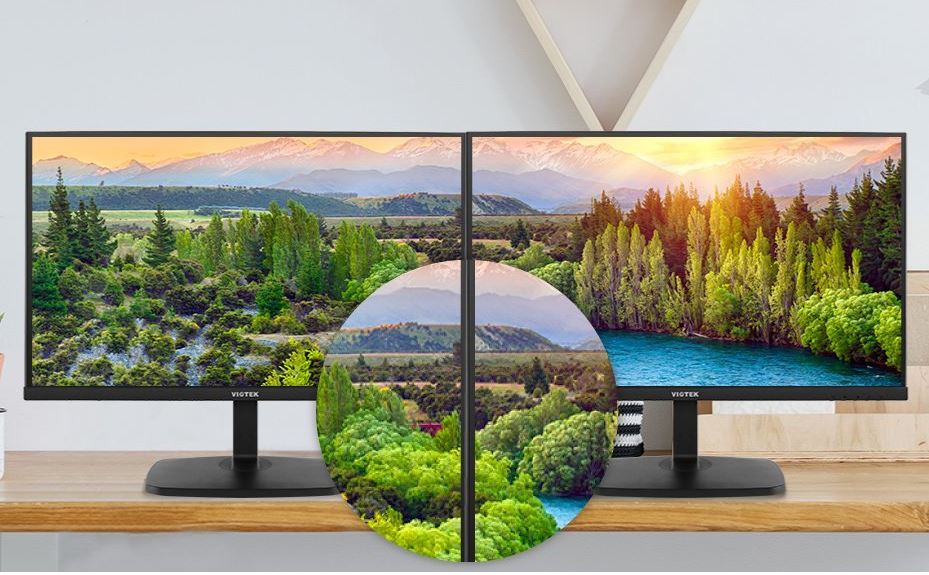
Refresh Rate and Response Time
Refresh rates are only something you have to think about if you’re a gamer, and if the games you play require very high frame rates. Higher refresh rates allow your monitor to display more frames per second, which is great for certain types of fast-paced videogames, but totally worthless for nearly everyone else.
Most visual media is captured around 30 frames per second, including movies, TV shows, and almost everything else. Even footage that’s captured at a much higher frame rate, like the 60 FPS theatrical release of the Hobbit movie, will still be perfectly supported by a monitor with ordinary refresh rates. The only cinematic experience you can’t achieve with a standard 60Hz monitor is 3D cinema, which would require a 144hZ refresh rate or higher.
Response time is similar to refresh rates. Even panels with relatively abysmal response times won’t be a bother to anyone except gamers who are playing certain types of games. As long as your panel has a response time that’s roughly 5ms, there’s little chance you’ll ever find yourself thinking about response time ever again.
But you should know some monitors have excellent response times as quick as 1ms, which can prevent a graphical glitch called “ghosting” from occurring during high-intensity gaming. But eliminating that kind of graphical glitch tags on a considerable amount to the price tag of a panel, especially if you don’t want those improvements to cost you performance in other areas.
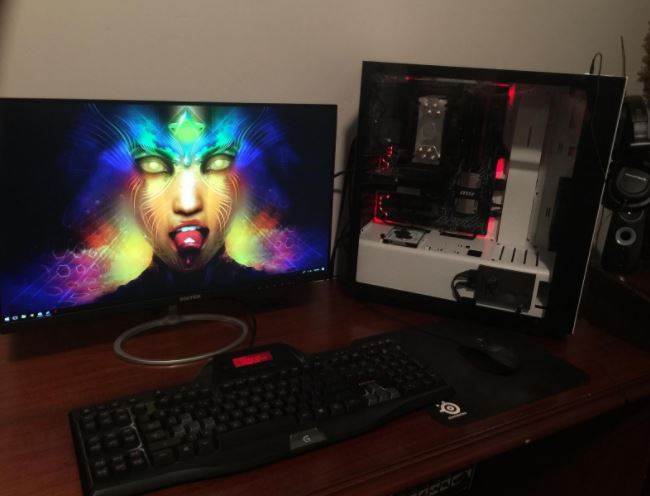
Flexibility
Flexibility is another thing to think about. Computer monitors don’t typically need the full flexibility to adjust to any angle, but you should still be able to make minor adjustments to the screen once it’s in position. The difference between 10-degrees of tilt and 25-degrees of tilt may not sound like much, but a few extra degrees make a world of difference when it comes to a finding the right viewing angle.
Unfortunately, height adjustability is a feature typically only found in high end monitors with large price tags. But any monitor that’s wall-mountable can effectively avoid that problem. Because a 27” monitor is large enough to reasonably consider wall mounting, you may want to find out if a prospective panel is VESA compliant. You can find aftermarket solutions and other work-around fixes for monitors that aren’t specifically designed to be mounted, but it’s much easier and cheaper if your panel is easily mountable to begin with.
Panel Type
Not all computer monitors are built the same way. Most monitors are twisting nematic (TN) panels. Compared to alternatives, TN panels are the least expensive, and have some of the most impressive response times. There are a handful of potential drawbacks to TN panels, but if they’re something you can work around, then choosing a TN panel will easily save you hundreds of dollars.
The primary drawback of TN panels is that they tend to have worse viewing angles than other types of panels. If you’re sitting directly in-front of your monitor, then you’ll never have a problem with your viewing angle. But if you have six friends crowd around your monitor to watch a movie, anyone watching from distant side angles will probably find the screen impossible to see.
Another possible drawback is that TN panels tend to produce motion blur when you’re playing games with high frame rates. If you need wider viewing angles and less motion blur, alternative panel types are available that can help you get around those limitations. But those features alone will spike the cost of your monitor by as much as 40%. In other words, if they’re not critical features that you can’t live without, then you’ll definitely want to choose a TN panel.
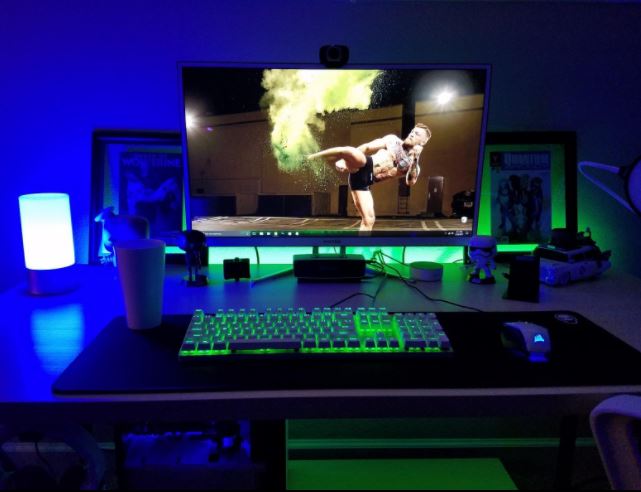
Matte vs Glossy
Glare can instantly disable even the best monitors on the market. Some panels make use of anti-glare protection called a matte finish, which protects your screen from the negative effects of direct light. However, that protection comes at a small cost in color acuity and contrast.
Glossy screens don’t provide anti-glare protection, which allows them to show a greater range of rich colors. However, they’re also totally impossible to look at once even a single beam of sunlight strikes their face. For highly controlled environments, glossy screens are an excellent pick because strictly speaking they’re going to provide a better quality image. But if you don’t have your lighting conditions under perfect control 100% of the time, then you’ll be kicking yourself if you don’t pick a matte panel.
Brand Reputation Matters
Finally, you’ll want to think about the monitor’s brand, and the types of connection ports it uses. Among computer components, monitors are one of the least likely parts to break. But there’s a big difference between a monitor that will turn on, and a monitor that keeps working as intended.
Monitors from less-reputable manufacturers are often prone to light-leaks, dead-pixels, and other minor agitations. Although these problems don’t technically break your monitor, they’re not great to look at. Unfortunately, these types of issues are rarely covered by buyer protection policies or warranties. More often than not, your best protection is choosing a reputable brand.
Required Connectivity
For connectivity, you’ll want to check your motherboard or graphics card to see what connections you need. DVI ports, DisplayPort, and other cabling ports vary widely from panel to panel. In the interests of future-proofing your monitor, it’s a good idea to make sure it has either a DVI or a DisplayPort connection. Older connection standards, like VGA, are largely being phased out by motherboard and GPU manufacturers. In the interests of keeping your monitor connected to your PC for years to come, DVI or DisplayPort are both an extremely safe bet.
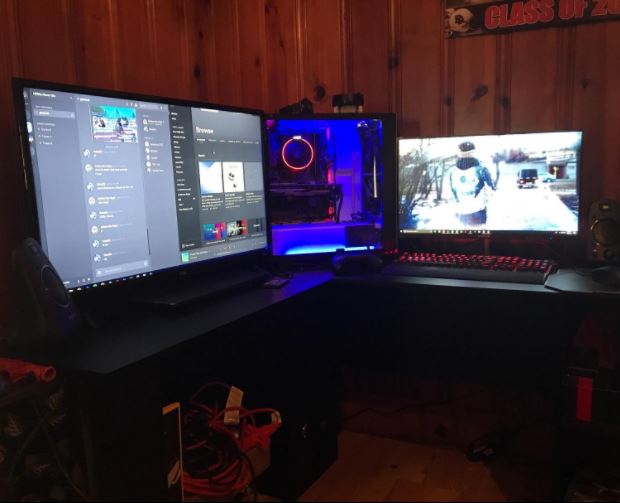
VIOTEK H270 27” Ultra-Thin Computer Monitor
As far as inexpensive 27” monitors go, it’s tough to even find a competitor for the Viotek H270. It makes use of a standard 1920 x 1080 resolution that’s perfectly suited for a panel of this size, but looks larger than you may expect due to the bezel-free design. After only a few hours of use, you’ll really appreciate how much the limited bezel size can add to the immersion with the screen.
But what you don’t find in this monitor is just as important as what you do. The H270 isn’t burdened with a bunch of superfluous features that are only beneficial to a select group of gamers. Instead, it’s focused on ensuring all its more essential features shine. The result is a gorgeous and effective panel, without a price tag that’s bloated by a bunch of features you don’t care about.
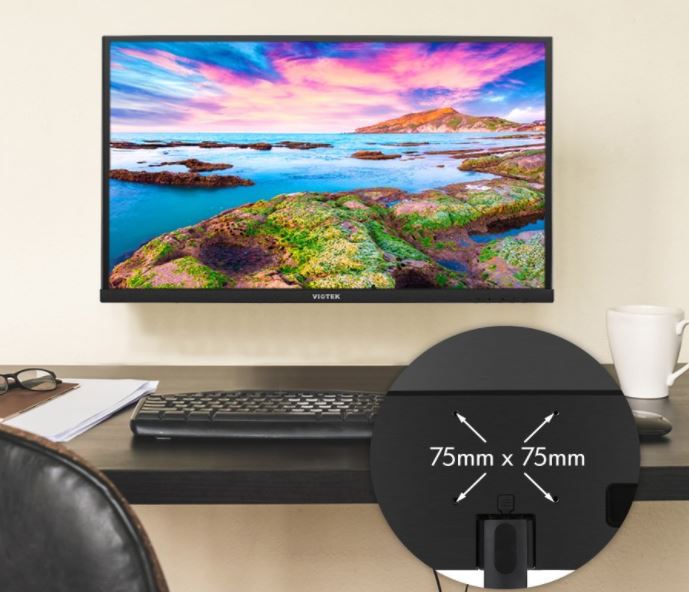
Build & Design
Viotek lists their H270 as weighing just over eight pounds, but that’s not including the four-pound stand. Even with stand attached, the H270 remains relatively lightweight and ready to fit comfortably on most desks. If you find the H270 can’t find a place on your desk, on the backside of the panel you’ll find VESA compliant mounting holes ready to solve the problem.
For connectivity, the H270 has support for every type of major connection, including one VGA port, one DVI port, and one HDMI port. The lack of additional HDMI ports may distress some people, but the fact DVI is represented helps ensure this monitor is ready with futureproofed connection standards. The H270 also includes a Kensington lock port to keep your monitor safe, which can be a nice addition for anyone using their panel in a public area, office, or anywhere where you may have to worry about theft.
Visual Fidelity
The best way to describe the look of this panel is “bright and full.” The Viotek H270 makes use of LED backlighting to ensure you’ll never have problems with the brightness of the panel. And in the interests of future upgrades, it’s worth noting the lack of bezel on this panel means two of these screens can be placed side by side for a virtually interconnected viewing experience.
For optimizing your color scheme, the H270 comes with preset modes suitable for watching movies, playing games, or working for hours on end. Movie-lovers will appreciate the 2,000,000:1 dynamic contrast ratio, which can help this panel construct more visually striking scenes.
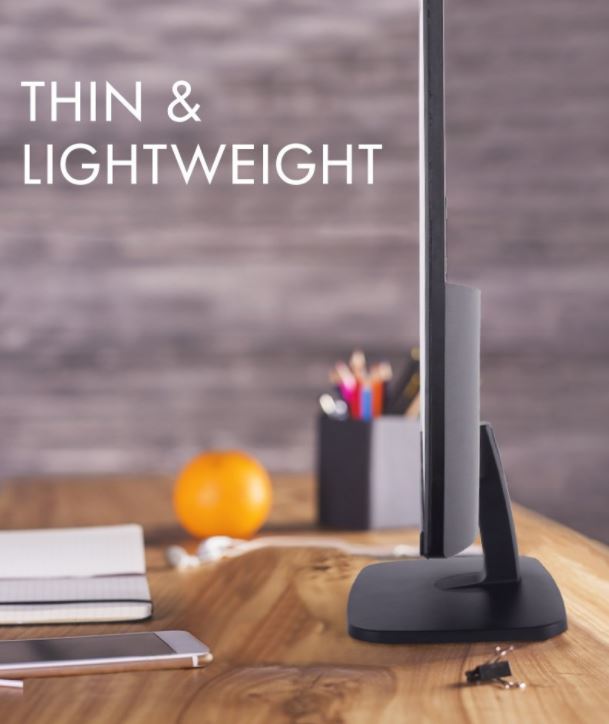
Because the H270 is a TN panel, it supports a standard 16.7 million color palate. If you’ve been using a monitor constructed in the past 10 years, you’re likely already using a 16.7 million color palate display. But if you’re using a monitor constructed earlier than 2008, there’s a good chance the H270 will give you considerably more colors than you’re used to seeing.
Finally, it’s worth knowing that the H270 makes use of anti-glare protection, so you don’t have to worry about turning off your computer every time some sun shines through the window. When a little light does come through the room, you’ll be glad to find a reasonably wide -5° ~ 15° range of tilt, helping you find a better viewing angle.
Performance
As far as performance goes, the H270 is best described as standard. If you’ve ever seen a computer monitor before, a 5ms response time is what you’re probably used to experiencing. The same goes for a 60 Hz refresh rate. These standards are more-than-enough for everyone except enthusiasts with very specific needs. For the purposes of high-fidelity gaming, it’s not unreasonable to invest in some of these features. But unless you feel you absolutely need those features, avoiding them will help you save hundreds of dollars.
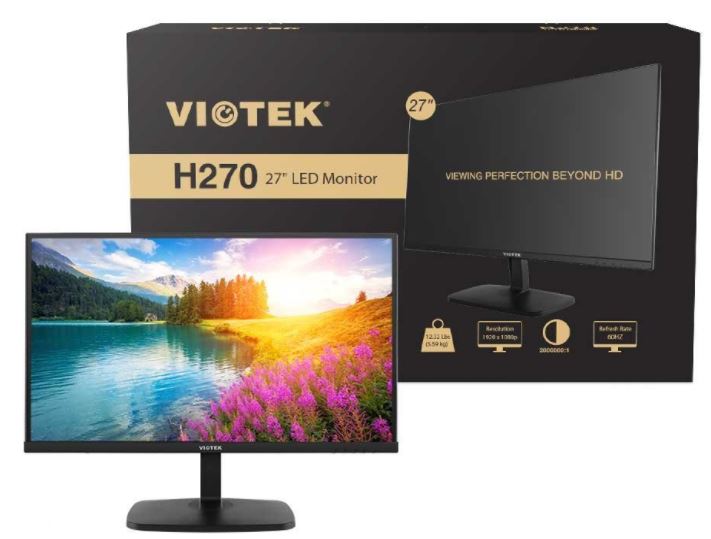
Who Should Choose the Viotek H270?
There’s a laundry list of things the Viotek H270 doesn’t have. It doesn’t have built-in speakers or Thunderbolt ports. It doesn’t have a fire-stripe LED display on the backside of the panel, and it won’t make your coffee for you. But most people don’t need those kinds of extra features. For watching movies, playing games, or staying busy with work, this panel is a great choice. It’s frankly all-but-impossible to beat the H270’s price to performance ratio.
That’s because the H270 is an instance of where you get exactly what you pay for, which is a large, 27-inch TN panel. If you don’t mind doubling your budget, you can find monitors on the market with higher resolutions, broader color schemes, and faster refresh rates. But for ordinary use, you simply don’t need those kinds of features. In short, Viotek’s H270 is a great panel for anyone looking for an inexpensive but large computer monitor. In all likelihood, you can expect this panel to last a full decade before you find yourself considering a replacement.
Meet Ry, “TechGuru,” a 36-year-old technology enthusiast with a deep passion for tech innovations. With extensive experience, he specializes in gaming hardware and software, and has expertise in gadgets, custom PCs, and audio.
Besides writing about tech and reviewing new products, he enjoys traveling, hiking, and photography. Committed to keeping up with the latest industry trends, he aims to guide readers in making informed tech decisions.

